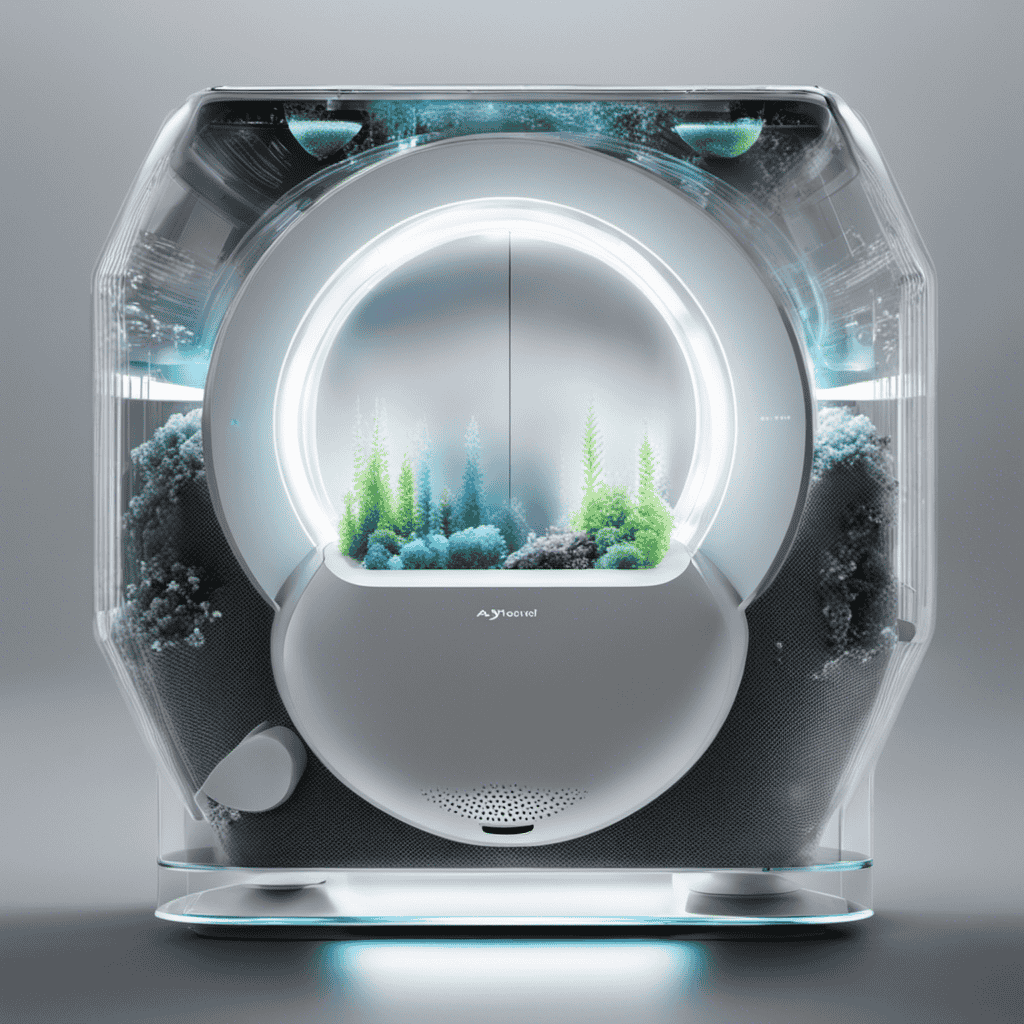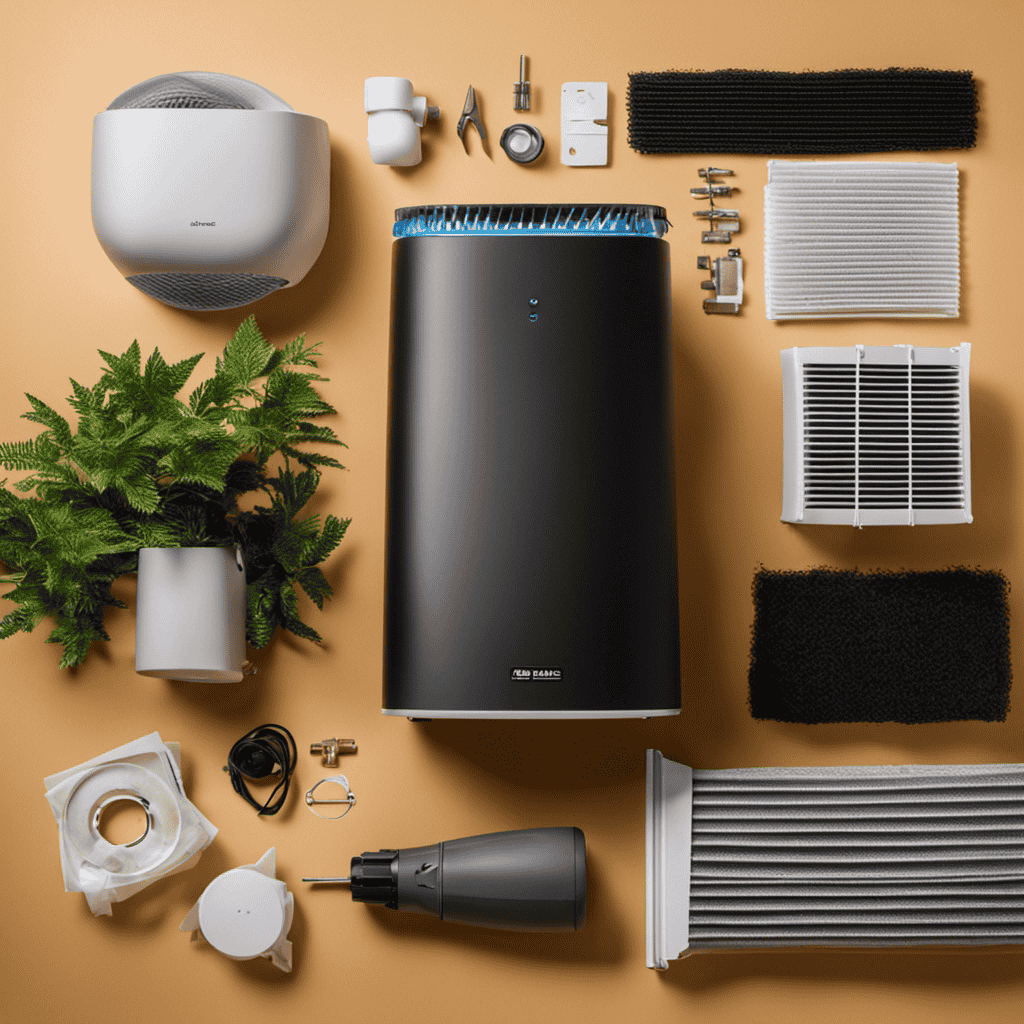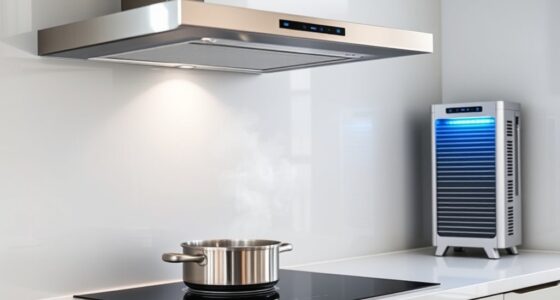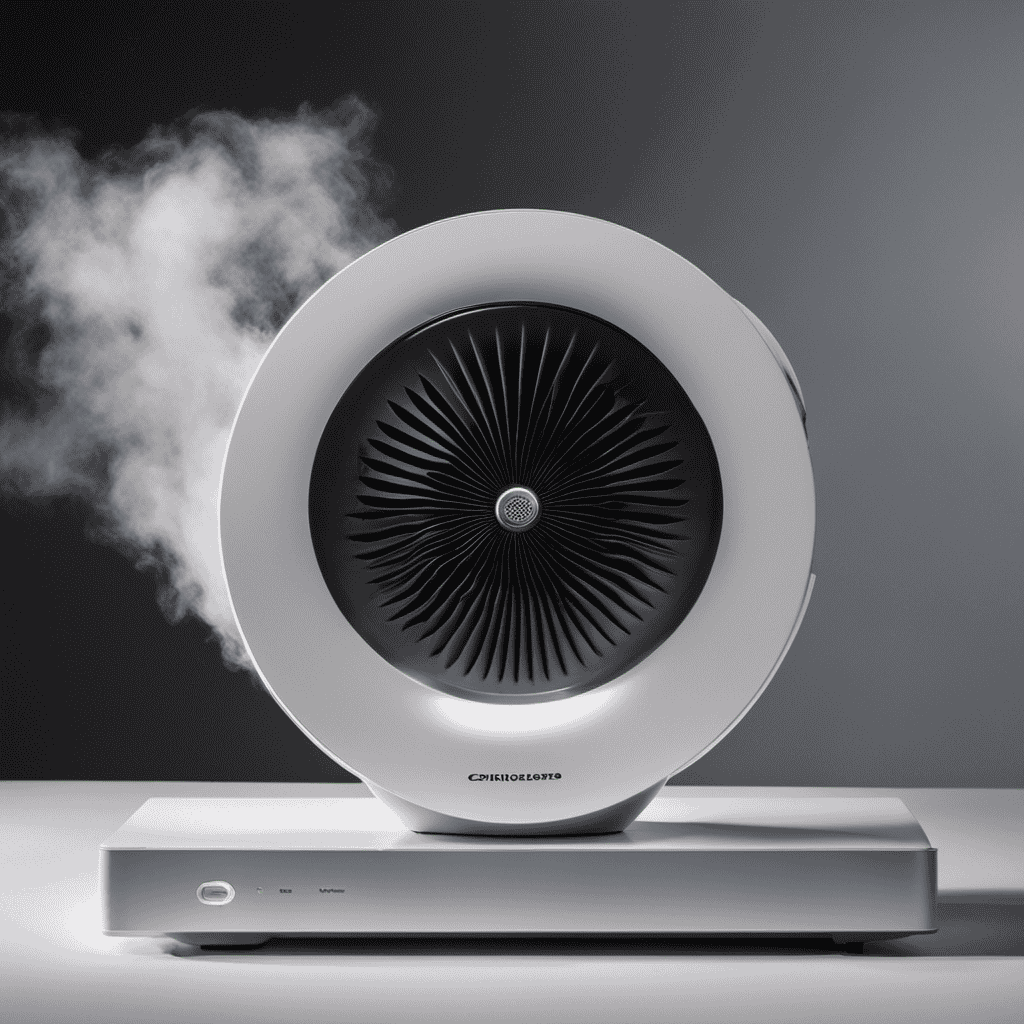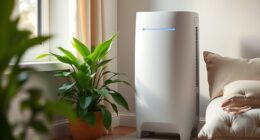As a specialist in home air purification, I can confidently state that an air purifier can truly transform the way your home smells, making it fresh and clean. Thanks to its advanced technology and powerful filtration system, it can effectively get rid of typical odors, leaving your home smelling pleasant and welcoming.
But how exactly does an air purifier work its magic? In this article, I will delve into the science behind air purifiers and provide you with valuable insights on choosing the right one to transform your home’s scent.
Key Takeaways
- Air purifiers eliminate harmful pollutants and allergens that cause unpleasant odors in your home.
- Different types of filters in air purifiers target specific pollutants and odorous compounds.
- Activated carbon filters and ozone-free technology are effective in trapping and breaking down odorous molecules.
- Regular maintenance of air purifiers, such as cleaning filters and using essential oils, helps maintain a fresh-smelling home.
Benefits of Using an Air Purifier in Your Home
Using an air purifier in your home can greatly improve the quality of the air you breathe. The advantages of using an air purifier are numerous.
Firstly, it effectively eliminates harmful pollutants such as dust, pollen, pet dander, and mold spores from the air. These pollutants can trigger allergies and respiratory problems, so removing them can have a significant impact on your health.
Additionally, air purifiers can also remove unpleasant odors from your home, leaving it smelling fresh and clean. The effectiveness of air purifiers in removing these pollutants and odors is due to their advanced filtration systems, which trap and remove particles as small as 0.3 microns.
This ensures that the air you breathe is free of contaminants, making your home a healthier and more comfortable environment.
Understanding the Science Behind Air Purifiers
To better understand the science behind air purifiers, you should explore how they work to improve indoor air quality. Air purifiers are designed to remove pollutants and allergens from the air, making it cleaner and healthier to breathe. They achieve this through the use of various types of air purifier filters. These filters capture and trap particles such as dust, pollen, pet dander, and smoke, preventing them from circulating in the air. There are different types of air purifiers available, including HEPA (High Efficiency Particulate Air) filters, activated carbon filters, and UV (Ultraviolet) light filters. Each type of filter targets specific pollutants, ensuring that the air in your home is effectively purified. Understanding the different types of air purifiers and their filters allows you to choose the most suitable option for your indoor air quality needs.
| Air Purifier Filters | Types of Air Purifiers |
|---|---|
| HEPA filters | Suitable for capturing particles as small as 0.3 microns, making them highly effective at removing allergens and pollutants from the air. |
| Activated carbon filters | Ideal for removing odors, gases, and chemical fumes from the air, as they have a large surface area that can absorb these substances. |
| UV light filters | Designed to kill bacteria, viruses, and mold spores by emitting ultraviolet light that damages their DNA and renders them inactive. |
Common Odors and How Air Purifiers Eliminate Them
Common odors, such as pet smells and cooking odors, can be effectively eliminated by air purifiers. These devices utilize advanced filtration systems to remove the particles and gases that cause these unpleasant smells.
Here are three ways air purifiers work to eliminate pet odors and remove cooking smells:
-
Activated Carbon Filters: Air purifiers equipped with activated carbon filters are highly effective in adsorbing and trapping odorous molecules. The activated carbon has a large surface area that attracts and holds onto these molecules, effectively neutralizing the smell.
-
HEPA Filters: High-Efficiency Particulate Air (HEPA) filters are designed to capture tiny particles, including dander and cooking odor particles. These filters remove up to 99.97% of particles as small as 0.3 microns, ensuring that the air is free from pet odors and cooking smells.
-
Ozone-Free Technology: Some air purifiers use ozone-free technology, which eliminates odors without producing harmful ozone molecules. This technology breaks down odorous compounds through chemical reactions, ensuring a fresh and odor-free indoor environment.
Factors to Consider When Choosing an Air Purifier for Smell Removal
When choosing an air purifier for smell removal, you should consider the size of the room and the specific odors you want to eliminate. Factors to consider include the coverage area of the air purifier, as it needs to be able to effectively clean the air in the entire room.
Additionally, you should look for an air purifier that is equipped with a carbon filter or activated carbon technology, as these are specifically designed to target and remove odors from the air.
Another important factor to consider is the type of air purifier. There are different types available, such as HEPA filters, ozone generators, and ionizers. Each type has its own advantages and disadvantages when it comes to odor removal.
Tips for Maintaining a Fresh-Smelling Home With an Air Purifier
If you want to keep your home smelling fresh, make sure you regularly clean the filters in your air purifier. Cleaning the filters not only helps to remove dust and allergens from the air, but it also ensures that the air purifier is functioning optimally.
In addition to cleaning the filters, there are other natural ways to freshen the air in your home with an air purifier. Here are three effective methods:
-
Using essential oils with an air purifier: Essential oils not only provide a pleasant scent but also have natural antimicrobial properties that can help eliminate odors. Simply add a few drops of your favorite essential oil to the air purifier and let it disperse throughout the room.
-
Open windows for ventilation: Fresh air from outside can help circulate and remove stale odors in the home. Opening windows for a few minutes each day can make a significant difference in the overall freshness of your home.
-
Keep your home clean: Regularly cleaning surfaces, floors, and upholstery can help prevent odors from building up in your home. Vacuuming carpets, dusting furniture, and washing linens can all contribute to a fresher-smelling living space.
Conclusion
In conclusion, using an air purifier in your home can greatly improve the smell and overall air quality. By removing odors and pollutants, air purifiers create a fresh and clean environment for you and your family to enjoy.
For example, a recent case study conducted in a household with pets found that after using an air purifier, the lingering pet odors were significantly reduced, creating a more pleasant living space.
With the right air purifier and proper maintenance, you can achieve a fresh-smelling home and breathe easier.

